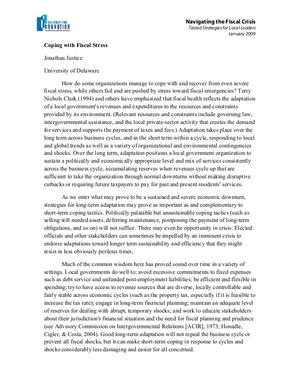
Stress, while others fail and are pushed by stress toward fiscal emergencies? Terry Nichols Clark (1994) and others have emphasized that fiscal health reflects the adaptation of a local government's revenues and expenditures to the resources and constraints provided by its environment. (Relevant resources and constraints include governing law, intergovernmental assistance, and the local private-sector activity that creates the demand for services and supports the payment of taxes and fees.) Adaptation takes place over the long term across business cycles, and in the short term within a cycle, responding to local and global trends as well as a variety of organizational and environmental contingencies and shocks. Over the long term, adaptation positions a local government organization to sustain a politically and economically appropriate level and mix of services consistently across the business cycle, accumulating reserves when revenues cycle up that are sufficient to take the organization through normal downturns without making disruptive cutbacks or requiring future taxpayers to pay for past and present residents' services.
This article is supporting documentation for the Alliance for Innovation Navigating the Fiscal Crisis white paper.
